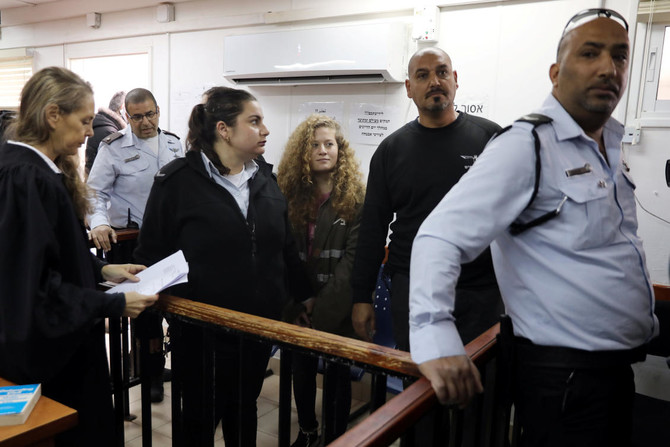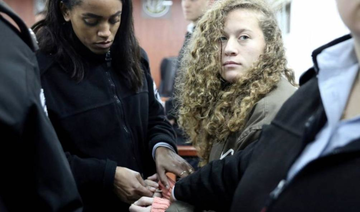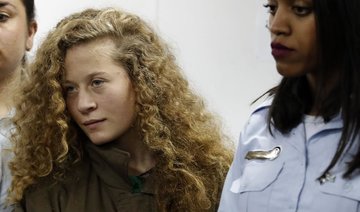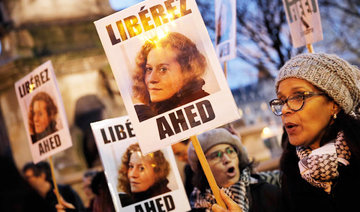OFER MILITARY BASE, West Bank: The closely watched trial of a Palestinian girl who slapped and punched two Israeli soldiers opened before an Israeli military court on Tuesday, but the judge ordered proceedings to be held behind closed doors in a case that has drawn wide criticism of Israel for prosecuting the teenager.
Ahed Tamimi, who turned 17 in prison last month, appeared fresh and confident as she was led into a courtroom packed with journalists and foreign diplomats.
She briefly gestured to relatives in the back of the room before the judge ordered everyone out except her family.
“Stay strong! Stay strong!” shouted her father, Bassem Tamimi.
After the prosecution read the 12-count indictment, the trial was adjourned until next month. Tamimi potentially faces years in prison if convicted of all charges, including assault and incitement in several incidents going back to April 2016.
She has been in detention since her arrest Dec. 19, four days after she was filmed confronting the soldiers outside her West Bank home.
Defense lawyer Gaby Lasky said she considers the court as an organ of what she described as an “illegal occupation” and that the indictment must be thrown out.
“It is a trial of occupation,” Lasky told reporters after the session. “This is a court of occupation, and Ahed was resisting occupation.”
Several senior Israeli officials have called for harsh punishment for Tamimi, describing her either as a terrorist, a serial troublemaker or a gullible teen being cynically manipulated by others.
The high-profile trial of Tamimi, one of an estimated 300 Palestinian minors in Israeli jails, has become the latest arena for the long-running battle between Palestinians and Israelis over global public opinion.
It also touches on the debate over what constitutes legitimate resistance to Israel’s rule over several million Palestinians, now in its 51st year.
Israel captured the West Bank, Gaza Strip and east Jerusalem in 1967, lands Palestinians seek for a future state. Repeated rounds of US-led Israeli-Palestinian negotiations on a partition deal have failed, and gaps have only widened between the sides.
Israel has framed Tamimi’s actions as purely criminal offenses. Among other things, she is being accused of incitement for comments she made on the same widely watched video that captured her scuffling with the soldiers.
In the Dec. 15 video, she talks about President Donald Trump’s recognition a week earlier of Jerusalem as Israel’s capital. She calls for large demonstrations as “the only way to reach results,” but says Trump must bear responsibility for any Palestinian reaction, including stabbings and suicide attacks, and that “everyone needs to do something and to unite.”
Tamimi’s family has said that she struck the two soldiers outside her West Bank home in frustration after having just learned that Israeli troops seriously wounded a 15-year-old cousin, shooting him in the head from close range with a rubber bullet during nearby stone-throwing clashes.
International human rights groups have criticized the full-throttle prosecution of a minor. Diplomats from the European Union and several European countries, including Germany and the Netherlands, attended Tuesday’s hearing as observers before they were kicked out along with journalists.
In his decision, the judge, Lt. Col. Menachem Lieberman, said the trial would remain closed for Tamimi’s own protection. “I didn’t think it’s good for the minor that there are 100 people in the courtroom,” he said.
Lasky, the defense lawyer, objected, saying the family wants the proceedings to be public. She accused the court of closing the hearings to prevent the world from watching.
“The court decided what is best for the court, and not what is good for Ahed,” she said. “The way to keep it out of everybody’s eyes is to close doors and not allow people inside the court for the hearing.”
She said her strategy would be to argue that Israel’s continued occupation over the West Bank, captured in the 1967 Mideast war, is illegal and that the indictment is aimed at deterring Ahed and other Palestinian youths “from resisting occupation nonviolently.”
Lasky said that her client did not respond to the charges read in court and that the next hearing was scheduled for March 11.
Earlier in the day, Tamimi’s father told The Associated Press as he headed into the court that he came “with no good expectations, because this a military court and it’s part of the Israeli military occupation.”
The Tamimis are from Nabi Saleh, a West Bank village of about 600 people, all members of the extended Tamimi family
Since 2009, residents there have staged regular anti-occupation protests that often ended with stone-throwing clashes.
Ahed Tamimi has participated in such marches from a young age, and has had several highly publicized run-ins with soldiers. One photo shows the then 12-year-old raising a clenched fist toward a soldier towering over her.
Palestinian teen goes on trial, Israeli judge bars public
Palestinian teen goes on trial, Israeli judge bars public

Israeli fire kills 11 on deadline for Lebanon withdrawal

- Israeli forces opened fire on ‘citizens who were trying to return to their villages’
- The Lebanese army says ‘ready to continue its deployment” as soon as Israel left’
BURJ AL-MULUK, Lebanon: Israeli troops opened fire in south Lebanon on Sunday, killing 10 residents and a Lebanese soldier, health officials said as hundreds of people tried to return to their homes on the deadline for Israel to withdraw.
Israel was all but certain to miss Sunday’s deadline, which is part of a ceasefire agreement that ended its war with the Iran-backed Hezbollah group two months ago.
The deal that took effect on November 27 said the Lebanese army was to deploy alongside United Nations peacekeepers in the south as the Israeli army withdrew over a 60-day period.
That period ends on Sunday.
Lebanon’s health ministry said Israeli forces opened fire on “citizens who were trying to return to their villages,” killing 11 and wounding 83.
The ministry’s toll includes a soldier from the Lebanese army, which also announced his death and said Israeli fire had wounded another soldier.
AFP journalists said convoys of vehicles carrying hundreds of people, some flying yellow Hezbollah flags, were trying to get to several villages despite the Israeli military’s continued presence.
“We will return to our villages and the Israeli enemy will leave,” even if it costs lives, said Ali Harb, a 27-year-old trying to go to Kfar Kila.
Residents could also be seen heading on foot and by motorbike toward the devastated border town of Mays Al-Jabal, where Israeli troops are still stationed.
Some held up portraits of slain Hezbollah leader Hassan Nasrallah, while women dressed in black carried photos of family members killed in the war.
Israeli military spokesman Avichay Adraee had issued a message earlier on Sunday to residents of more than 60 villages in southern Lebanon telling them not to return.
Speaking from the border town of Aita Al-Shaab, Hezbollah lawmaker Hassan Fadlallah hailed in a television appearance “the return of residents in spite of the threats and warnings.”
Lebanese President Joseph Aoun, the former army chief who took office earlier this month after a two-year vacancy in the post, called on residents to keep a cool head and “trust the Lebanese army,” which he said wanted “to ensure your safe return to your homes and villages.”
On Saturday, the army had said the delay in implementing the agreement was the “result of the procrastination in the withdrawal from the Israeli enemy’s side.”
A joint statement from the UN special coordinator for Lebanon and the head of the UN peacekeeping mission on Sunday acknowledged “that the timelines envisaged in the November Understanding have not been met.”
“As seen tragically this morning, conditions are not yet in place for the safe return of citizens to their villages along the Blue Line,” the statement said, referring to the border. It urged residents “to exercise caution.”
Israeli forces have left coastal areas of southern Lebanon, but are still present in areas further east.
The ceasefire deal stipulates that Hezbollah pull back its forces north of the Litani River — about 30 kilometers (20 miles) from the border — and dismantle any remaining military infrastructure in the south.
But Israeli Prime Minister Benjamin Netanyahu’s office said on Friday that the “agreement has not yet been fully enforced by the Lebanese state,” so the military’s withdrawal would continue beyond the Sunday deadline.
The Lebanese army said it was “ready to continue its deployment” as soon as Israel left.
Lebanese caretaker Prime Minister Najib Mikati called Sunday for the backers of the ceasefire agreement — a group that includes the United States and France — “to force the Israeli enemy to withdraw.”
Lebanese state media have reported that Israeli forces have carried out demolitions in villages they control.
Aoun spoke on Saturday with his French counterpart Emmanuel Macron about the “need to oblige Israel to respect the terms of the deal,” adding it must “end its successive violations, including the destruction of border villages.”
Macron’s office said the French president had called on all parties to the ceasefire to honor their commitments as soon as possible.
The fragile truce has generally held, even as the warring sides have repeatedly traded accusations of violations.
The deal ended two months of full-scale war that had followed nearly a year of low-intensity exchanges.
Hezbollah began trading cross-border fire with the Israeli army the day after the October 7, 2023 attack on Israel by its Palestinian ally Hamas, which triggered the war in Gaza.
Israel’s campaign delivered a series of devastating blows against Hezbollah’s leadership including its longtime chief Nasrallah.
Israeli fire kills 1, wounds 7 as Palestinians are kept out of north Gaza over a ceasefire dispute

- Under the ceasefire, Israel on Saturday was to begin allowing Palestinians to return to their homes in northern Gaza on foot
- Israel put the move on hold until Hamas freed a hostage who Israel said was supposed to have been released
DEIR AL-BALAH, Gaza Strip: A Palestinian man was killed and seven people were wounded by Israeli fire overnight, local health officials said Sunday, as crowds gathered in hopes of returning to the northern Gaza Strip under a fragile week-old ceasefire aimed at winding down the war.
In a separate development, President Donald Trump suggested Saturday that most of Gaza’s population should be at least temporarily resettled elsewhere, including in Egypt and Jordan, in order to “just clean out” the war-ravaged enclave. Egypt, Jordan and the Palestinians themselves have previously rejected such a scenario.
Under the Israel-Hamas ceasefire, Israel on Saturday was to begin allowing Palestinians to return to their homes in northern Gaza on foot through the so-called Netzarim corridor bisecting the territory. Israel put the move on hold until Hamas freed a hostage who Israel said was supposed to have been released that day.
The man was shot and two others were wounded late Saturday, according to the Awda Hospital, which received the casualties. Another five Palestinians, including a child, were wounded early Sunday in a separate shooting, the hospital said.
There was no immediate comment from the Israeli military.
Israel has pulled back from several areas of Gaza as part of the ceasefire, which came into force last Sunday, but the military has warned people to stay away from its forces, which are still operating in a buffer zone inside Gaza along the border and in the Netzarim corridor.
Hamas freed four young female Israeli soldiers on Saturday, and Israel released some 200 Palestinian prisoners, most of whom were serving life sentences after being convicted of deadly attacks.
But Israel said another hostage, the female civilian Arbel Yehoud, was supposed to have been released as well, and that it would not open the Netzarim corridor until she was freed. It also accused Hamas of failing to provide details on the conditions of the hostages set to be freed in the coming weeks.
The United States, Egypt and Qatar, which mediated the ceasefire, were working to address the dispute.
The ceasefire reached earlier this month after more than a year of negotiations is aimed at ending the 15-month war triggered by Hamas’ Oct. 7, 2023, attack and freeing scores of hostages still held in Gaza in return for hundreds of Palestinian prisoners.
Around 90 hostages are still being held in Gaza, and Israeli authorities believe at least a third, and up to half of them, were killed in the initial attack or died in captivity.
The first phase of the ceasefire runs until early March and includes the release of a total of 33 hostages and nearly 2,000 Palestinian prisoners. The second — and far more difficult — phase, has yet to be negotiated. Hamas has said it will not release the remaining hostages without an end to the war, while Israel has threatened to resume its offensive until Hamas is destroyed.
Hamas-led militants killed some 1,200 people in the Oct. 7 attack, mostly civilians, and abducted around 250 people. More than 100 were freed during a weeklong ceasefire in November 2023. Israeli forces have rescued eight living hostages and recovered the remains of dozens more, at least three of whom were mistakenly killed by Israeli forces. Seven have been freed since the latest ceasefire began.
Israel’s military campaign has killed over 47,000 Palestinians, more than half of them women and children, according to Gaza’s Health Ministry. It does not say how many of the dead were combatants. The Israeli military says it has killed over 17,000 fighters, without providing evidence.
Israeli bombardment and ground operations have flattened wide swaths of Gaza and displaced around 90 percent of its population of 2.3 million people. Many who have returned to their homes since the ceasefire began have found only mounds of rubble where their neighborhoods once stood.
WHO chief urges end to attacks on Sudan health care after 70 killed in drone strike

- WHO chief Tedros Adhanom Ghebreyesus: ‘We continue to call for a cessation of all attacks on health care in Sudan’
The head of the World Health Organization called on Saturday for an end to attacks on health care workers and facilities in Sudan after a drone attack on a hospital in Sudan’s North Darfur region killed more than 70 people and wounded dozens.
“As the only functional hospital in El Fasher, the Saudi Teaching Maternal Hospital provides services which include gyn-obstetrics, internal medicine, surgery and pediatrics, along with a nutrition stabilization center,” WHO Director-General Tedros Adhanom Ghebreyesus posted on X after the Friday strike.
“We continue to call for a cessation of all attacks on health care in Sudan, and to allow full access for the swift restoration of the facilities that have been damaged,” Tedros said.
The war between Sudan’s army and the Rapid Support Forces (RSF), which broke out in April 2023 due to disputes over the integration of the two forces, has killed tens of thousands, driven millions from their homes and plunged half of the population into hunger.
The conflict has produced waves of ethnically driven violence blamed largely on the RSF, creating a humanitarian crisis.
Darfur Governor Mini Minnawi said on X that an RSF drone had struck the emergency department of the hospital in the capital of North Darfur, killing patients, including women and children.
Fierce clashes have erupted in El Fasher between the RSF and the Sudanese joint forces, including the army, armed resistance groups, police, and local defense units.
Devastating toll for Gaza’s children: Over 13,000 killed and an estimated 25,000 injured, UN says

- UN says out of 40,717 Palestinian bodies identified so far, roughly a third or 13,319 were children
- Nearly 19,000 children were hospitalized for acute malnutrition in four months before December 2025
UNITED NATIONS: The war in Gaza has been devastating for children: More than 13,000 have been killed, an estimated 25,000 injured, and at least 25,000 hospitalized for malnutrition, according to UN agencies.
As Britain’s deputy UN ambassador, James Kariuki, recently told the Security Council, “Gaza has become the deadliest place in the world to be a child.”
“The children of Gaza did not choose this war,” he said, “yet they have paid the ultimate price.”
The UN Office for the Coordination of Humanitarian Affairs reported Thursday that of the 40,717 Palestinian bodies identified so far in Gaza, one-third – 13,319 – were children. The office said Friday the figures came from Gaza’s Ministry of Health.

The UN children’s agency, UNICEF, said the estimate of 25,000 children injured came from its analysis based on information collected together with Gaza’s Health Ministry.
UN deputy Secretary-General Amina Mohammed said nearly 19,000 children had been hospitalized for acute malnutrition in the four months before December.
That figure also came from UNICEF, which said it was from data collected by UN staff in Gaza focusing on nutrition, in coordination with all pertinent UN agencies.
The UN says thousands of children have also been orphaned or separated from their parents during the 15-month war.
Yasmine Sherif, executive director of the UN global fund Education Cannot Wait, told a press conference that 650,000 school-age children haven’t been attending classes and the entire education system has to be rebuilt because of the widespread destruction in Gaza.

Diplomats from Britain, France and other countries also cited the toll on Israeli children who were killed, injured and abducted during Hamas’ attack on southern Israel on Oct. 7, 2023 – with some still being held hostage.
Israel’s UN Ambassador Danny Danon asked the Security Council whether it ever paused to consider the plight of Israeli children “mutilated, tortured and murdered” on Oct. 7, the 30 who were kidnapped and the tens of thousands who have been displaced, their homes destroyed.
“The trauma they have endured is beyond imagination,” he said.
Danon called Thursday’s council meeting on children in Gaza “an affront to common sense,” accusing Hamas of turning Gaza into “the world’s largest terror base” and using children as human shields.
“The children of Gaza could have had a future filled with opportunity,” he said. “Instead, they are trapped in a cycle of violence and despair, all because of Hamas, not because of Israel.”
Devastating toll for Gaza’s children: Over 13,000 killed and an estimated 25,000 injured, UN says

- The UN says thousands of children have also been orphaned or separated from their parents during the 15-month war
UNITED NATIONS: The war in Gaza has been devastating for children: More than 13,000 have been killed, an estimated 25,000 injured, and at least 25,000 hospitalized for malnutrition, according to UN agencies.
As Britain’s deputy UN ambassador, James Kariuki, recently told the Security Council, “Gaza has become the deadliest place in the world to be a child.”
“The children of Gaza did not choose this war,” he said, “yet they have paid the ultimate price.”
The UN Office for the Coordination of Humanitarian Affairs reported Thursday that of the 40,717 Palestinian bodies identified so far in Gaza, one-third – 13,319 – were children. The office said Friday the figures came from Gaza’s Ministry of Health.

The UN children’s agency, UNICEF, said the estimate of 25,000 children injured came from its analysis based on information collected together with Gaza’s Health Ministry.
UN deputy Secretary-General Amina Mohammed said nearly 19,000 children had been hospitalized for acute malnutrition in the four months before December.
That figure also came from UNICEF, which said it was from data collected by UN staff in Gaza focusing on nutrition, in coordination with all pertinent UN agencies.
The UN says thousands of children have also been orphaned or separated from their parents during the 15-month war.
Yasmine Sherif, executive director of the UN global fund Education Cannot Wait, told a press conference that 650,000 school-age children haven’t been attending classes and the entire education system has to be rebuilt because of the widespread destruction in Gaza.

Diplomats from Britain, France and other countries also cited the toll on Israeli children who were killed, injured and abducted during Hamas’ attack on southern Israel on Oct. 7, 2023 – with some still being held hostage.
Israel’s UN Ambassador Danny Danon asked the Security Council whether it ever paused to consider the plight of Israeli children “mutilated, tortured and murdered” on Oct. 7, the 30 who were kidnapped and the tens of thousands who have been displaced, their homes destroyed.
“The trauma they have endured is beyond imagination,” he said.
Danon called Thursday’s council meeting on children in Gaza “an affront to common sense,” accusing Hamas of turning Gaza into “the world’s largest terror base” and using children as human shields.
“The children of Gaza could have had a future filled with opportunity,” he said. “Instead, they are trapped in a cycle of violence and despair, all because of Hamas, not because of Israel.”




















